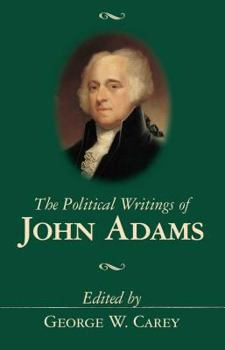The Political Writings of John Adams
Select Format
Select Condition 
Book Overview
This book is the most comprehensive single volume of John Adam's political writings ever published. All of his major political works and all of his most important political correspondence are... This description may be from another edition of this product.
Format:Hardcover
Language:English
ISBN:0895262924
ISBN13:9780895262929
Release Date:July 2001
Publisher:Gateway Editions
Length:712 Pages
Weight:2.85 lbs.
Dimensions:1.8" x 6.2" x 9.2"
Customer Reviews
3 ratings
Plain Adams
Published by Thriftbooks.com User , 13 years ago
You MUST READ this if you liked the Jone Adams you saw in the HBO series. Although he is credieted with the funding of conservative ideology in this country, his insights and record of historical thought are important lessons for all political dispositions. My sugestion for reading - pick and choose sections when current events suggest historical underpinnings. Now go!
John Adams...where's the respect?
Published by Thriftbooks.com User , 14 years ago
Great book...great man. Of all the founders, he was my favorite, and unlike Jefferson and Washington, who kept slaves because they were wealthy land owners, even though they knew it was wrong...Adams refused the "obmination" forever on principle. He also wrote the first Constitution of the US (MA) on which ours was modeled after... And yet, no huge building stands in DC for him...and why? Because, he was NOT a politician...he was an honest man. At least, that's my opinion. Get the book, and be amazed.
John Adams, Patriot Sage and the "American Burke"
Published by Thriftbooks.com User , 18 years ago
Pretentious, pugnacious in his temperament, possessed of a sense of nobility, John Adams was the quintessential Yankee and the Second President of the United States. This collection of his most famous political treatises and his correspondence is most appealing. With a keen intellect, his statesmanship is penetrating and has earned him recognition as the American Burke. Adams was prescient in his understanding of human nature, recognizing that "[s]elf-interest, private avidity, ambition, and avarice, will exist in every state of society, and under every form of government. A succession of powers and persons, by frequent elections, will not lessen these passions in any case, in a governor, senator, or representative, nor will the apprehension of an approaching election restrain them from indulgence if they have the power." Reconciling a flawed nature with man's yearning for liberty was no small task, but he suggested that ordered liberty could be fortified through a mixed constitution: "The nation which will not adopt equilibrium of power must adopt a despotism. There is no alternative. Rivalries must be controlled, or they will throw all things into confusion; and there is nothing but despotism or a balance of power which can control them." Adams surmised that the great work of those statesmen at the Convention was to fortify the British inheritance which was itself a mixed constitution while giving it a strong measure of steadiness and permanence by edifice in the Constitution. In Adams' summation, the licentious nature of democracy was to be quelled by establishing a proper equilibrium with the natural aristocratic and monarchial elements. This was requisite for a free government and history demonstrated that a lack of balance sputters off into despotism. Adams was keenly aware of the fragility of the American experiment in ordered liberty, and he shunned quixotic ideologues. He was utterly cynical of Enlightenment views which held the perfectibility of mankind as tenable, and he saw innumerable odds posed against ordered liberty. It is not surprising that John Adam's political theory perhaps has been glossed over by the egalitarian-minded historians of our day, because he rejected the major ideological assumptions fueling the French Revolution. He was keenly appreciative of the Anglo-American common law tradition and the vibrant interplay of cultures that shaped the distinctively American political tradition. "Few men will deny that there is a natural aristocracy of virtues and talents in every nation and in every part, in every city and village. Inequalities are a part of the natural history of man," avowed John Adams. In stark opposition to the heresy of equality, Adams postulated a natural aristocracy of talent that was innate to all men gathered in association. Adams realised that man would be lead by his better man, but this natural aristocracy (i.e. rule by the best) was not something to be imposed upon civil society, but was essential





